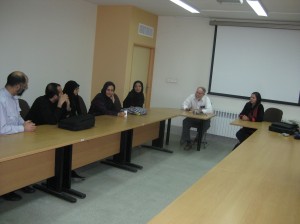Studying America in Tehran

Speaking with American Studies students at Tehran University
On our last day in Tehran, we had a meeting with Dr. Hosseini, professor of American Studies at Tehran University, and some of his M.A. students. The American Studies program has only existed for a year and a half, and they focus on learning about American culture and life, as well as about politics. Dr. Hosseini feels they have a unique approach in that they are reading contemporary writings in the original language, a practice he says is not used in the US in Iranian studies programs. For instance, the students we met with had all read Barack Obama’s two books in English (something I have not yet done). I have been impressed with many people I’ve talked to in Iran and their sophisticated understanding of US politics and culture.
We talked a bit about cultural similarities between the US and Iran, and I mentioned that most Iranians I have met have seen more American movies and TV shows than I have. When I mentioned that I don’t have cable TV, Dr. Hosseini said, “See! An American without cable!” We discussed some of what the students are studying, from American ethnicities to family life in the US to American cinema. The students have very interesting research projects planned. One woman is working on a dissertation about representations of Muslims in post-9/11 literature, with John Updike’s Terrorist as one of her sources. Another student is interested in studying the growth of nonviolent movements within the United States and how it contrasts with the US’s role engaging in violence abroad.
We spent most of the time talking about US-Iran relations. When I asked what they most wanted people in the US to know about Iran, one simple but important idea that came up is that Iranians are just ordinary people, living their lives, separate from their government. Dr. Hosseini mentioned the problem of using threats as opposed to communication. On this topic, I mentioned that we are working to pressure Congress to stop hostile rhetoric and sanctions, and explaining to them how it is counterproductive, and I asked for their perspective on the congressional strategy. Dr. Hosseini said that Iran has existed for thousands of years more than the US, and would not exist as it does today if it were vulnerable to these types of threats. He said that the “good cop/bad cop” idea that some members of Congress have regarding Iran is childish, and we need to engage in actual dialogue. Iranians are smart, educated people who understand a lot about American politics and will respond much more positively to respectful negotiations.
I told Dr. Hosseini and his students that I would carry their messages and my stories about the wonderful people of Iran and their desire for peace, and also work to encourage more exchanges between both countries so we can learn more about each other. As I get ready to head the airport to return to the US, I am reminded again of what a privilege it has been to have the opportunity to spend time here, witness the beautiful culture, meet amazing people, and reinforce my commitment to building a peaceful relationship between our countries. Thank you to all of you for your comments on the blog and your warm and encouraging emails of support. I am excited to come back and share my photos, videos and stories with you soon.



Thanks for sharing, Rebecca. I particularly loved the details about American Studies in the U.S. It is nice to remember we are “foreigners” who need to be studied sometimes….